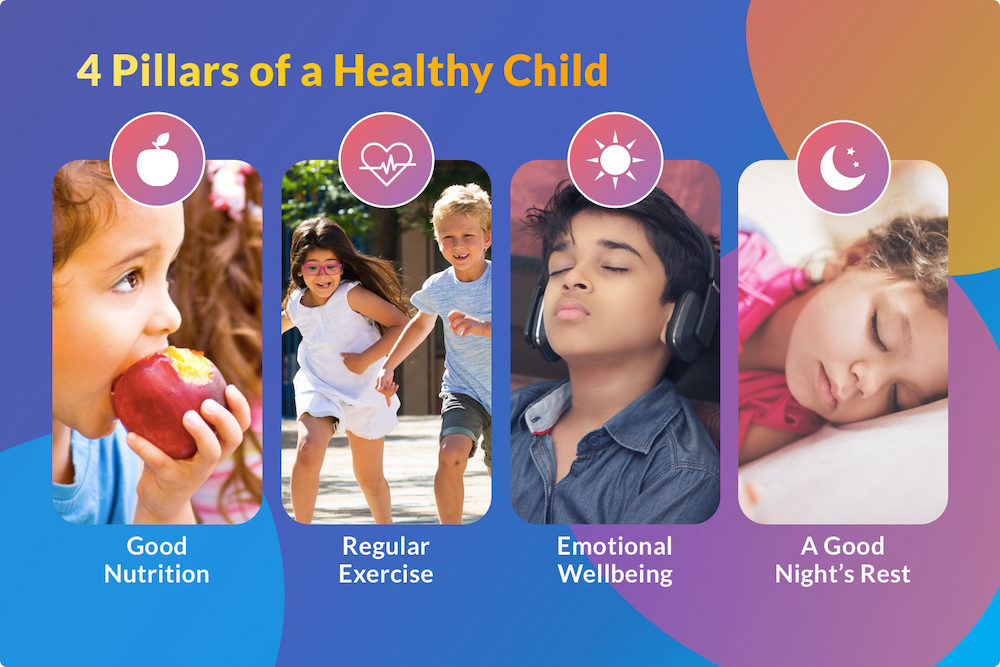
- 3 mins
Bedwetting – Causes and Tips to Help Kids Overcome It

Kids thrive when their most essential needs are in balance. While that can feel like an overwhelming responsibility for parents, it helps to remember that kids’ fundamental needs are actually pretty simple.
There are four main pillars that parents can prioritize and support to set kids up for success. These are nutrition (healthy eating and eating regularly); exercise (daily movement for health and release of energy); mental health (stress management and emotional wellbeing); and sleep health (a full and good night’s rest).
“Well-balanced children, who have their basic needs met, behave positively. As parents, we have the opportunity to create a positive pattern and foundation of nutrition, movement, mental health, and high-quality sleep that will be with our children for the rest of their lives.”
Kelly Bourne, Pediatric Nurse and Positive Discipline Parenting Educator
Even though our little ones’ needs are simple, it can sometimes be daunting knowing where to start. Here are some actionable and expert-backed tips to help support your child’s health and happiness:
Healthy eating and eating regularly are among the most fundamental pillars of childhood health.
“Eating a well-balanced, nutrient-dense diet of healthy fats, protein, fruits, and veggies, and ensuring children eat three meals a day with two healthy snacks is key to a child’s health and brain development.”
Megan Barella, Certified Positive Discipline Parent Educator
She suggests offering a wide variety of foods on kids’ plates, with at least one or two food items you know they like. “Remember the importance of modeling your love of food, healthy eating, and being a food adventurer,” she says. “Share your love of food and cooking with children, and involve them in meal planning and preparation.”
Of course, any parent knows it’s not always quite that easy to execute a successful nutrition plan. Bourne says, “We all know that eating a nutritious, balanced diet is important for our kids’ health — but between picky eating, an abundance of sugary options in the grocery aisle, and running short on time to cook, this is often easier said than done.”
So instead of resorting to lecturing, bribing, or making deals with your kids to eat their veggies, try switching your perspective. “If your end goal is to get your kids to eat healthily, they need to be exposed to a variety of healthy options. No matter which way you slice it, it’s not little Johnny filling the grocery cart with hot dogs and sugary cereal — it’s us. If we want our kids to stop eating junk, the first step is to stop buying it.”
Once you’ve provided your kids with healthy options, “take a deep breath and back off,” she says. “Fighting and mealtime power struggles aren’t exactly great tools for instilling a love of food and family harmony. No one likes to feel forced to do something, and backing away from the fight is often enough to get kids to try new foods.”
Lisa Richards, nutritionist and author of The Candida Diet, agrees that a parent’s heavy hand can be not only ineffective but even potentially damaging when it comes to food.
“Many concepts around getting children to eat can actually increase the likelihood of children developing disordered eating habits later in life. Children who feel they must finish all their food aren’t able to recognize their body’s fullness cues and push past what they’d normally eat leading them to overeat. Telling children they must eat their vegetables, or using healthy foods as punishment or bargaining, reinforces the idea that healthy foods aren’t as good [tasting] as low-nutrient foods.”
Lisa Richards, Nutritionist and Author
So rather than taking these approaches, she says, parents should encourage kids to eat as much as they can and help them to understand their fullness cues. “Discussing and describing healthy foods in a positive way will help avoid an aversion that is based on a child’s perception rather than their actual preference,” she explains.
Movement is essential for physical and mental health, so getting enough exercise is key to kids’ development — and their attitude, too.
“Movement sets the mind and the body at ease and readies children for cognitive work and play. Oxygen to the brain and sweat are key components for healthy living.”
Karen Aronian, Parenting and Education Expert
Although it’s critically important, exercise shouldn’t be a chore for kids — it should be joyful, fluid, and natural. “If we want our kids to be active, we need to make it fun, and there’s no better way to do this than to focus on play,” Bourne says. “Get outside, go for a walk, and encourage your kids to make their own fun. The more you can make free play a habit, the healthier and happier your kids will be.”
Barella suggests parents can keep exercise and movement top of mind amid pandemic circumstances by setting a phone alarm a few times a day to ensure kids are getting up to play and running around regularly. She also advises parents to avoid getting too caught up in the specific definition of exercise, or the timeline for it. “Five-minute spurts of movement exercise throughout the day can add up,” she says.
Kaitlin Seiffert of ParentingPod.com explains that mental health tends to be “the most overlooked aspect of a child’s overall health” — but that promoting their mental wellbeing is crucial at all stages of development.
Age-appropriate ways to boost kids’ mental health include hosting playdates to help kids develop friendships; encouraging them to step away and take deep breaths when they feel frustrated; and regulating their schedules so they have enough time to rest and relax.
“Overwhelming children with too many activities and responsibilities can create an unhealthy level of stress.”
Kaitlin Seiffert, Parenting Pod
Parents should also remember to acknowledge their little one’s feelings and let them know that it’s okay to feel the way they do. “Teaching your children that all emotions are safe to feel is the goal. We, as parents, should model for our children how to ride the waves of our emotional experiences,” Barella says. “Learning how to release, positively express, and integrate negative emotions in safe and healthy ways is a foundation for secure attachment and mental health.”
Parents can support kids’ mental health by adopting an age-appropriate meditation practice early in their development. The Moshi app offers mindfulness meditations made just for kids. “Mindfulness is about being aware of what you are experiencing in the present moment, whether you’re quiet and relaxed or running and jumping,” Bourne says.
Sleep is one of the most essential human needs — especially for kids. “This is because it’s during sleep that children’s bodies grow and develop,” Seiffert says. “It is also when things they learned and took in throughout the day are stored in the brain.”
To encourage adequate, high-quality sleep, establish consistent bedtime routines. “Set a specific bedtime for your child and try the best you can to stick to it,” Seiffert says. “Reading bedtime stories, listening to relaxing music, or taking a warm bath with lavender-scented soap are all tested and approved methods for promoting a healthy bedtime routine for your child.”
Barella says that parents can reset the schedule gently and incrementally if they suspect kids aren’t getting enough sleep.
“Families have transformed meltdowns, power struggles, and prolonged bedtimes simply by beginning the bedtime routine 30 minutes to one hour earlier. This earlier bedtime produces magical results because when a child misses their sleep window, the body produces cortisol, a stress hormone, which results in a second wind or a meltdown. By bumping up the start of the bedtime routine, you can meet your children’s sleep needs for healthy development, reduce stress by having a smoother bedtime, and prevent negative behavior the next day.”
Megan Barella, Certified Positive Discipline Parent Educator
And remember, kids are also looking to their parents for role modeling around sleep — as well as nutrition, exercise, and managing their emotions. Aronian says, “If parents and guardians model, children will follow.”